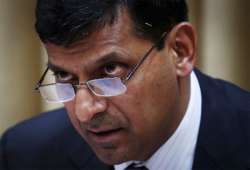Don't write me off, I'll be around, says outgoing Raghuram Rajan on premature 'obituaries'
Ever since he has announced that he will not be there for the second term, he has been slamming all his critics including BJP MP Subramanian Swamy without uttering his name.

New Delhi: Giving it back to his critics for a series of nasty remarks pointed towards his exit from Reserve Bank of India (RBI), Raghuram Rajan said, “Don’t write me off, I’ll be around.”
"I feel like in the last few days I have read a lot of my obituaries and I am still here for two-and-a-half months in this job. After that Iwill be still around somewhere in the world, probably a lot in India so don't write me off," Rajan said in a speech to Assocham, an industry body, in Bengaluru.
Ever since he has announced that he will not be there for the second term, he has been slamming all his critics including BJP MP Subramanian Swamy without uttering his name.
"I'm here to talk on resolution of financial distress. Talking about obituaries rather than birth announcements," he said.
Also read - Brexit referendum: RBI ready with liquidity to keep markets 'well behaved', says Raghuram Rajan
Taking on critics of his monetary policy, Rajan blamed the record low credit growth to the stress in public sector banks and not due to high interest rates.
"I will argue that the slowdown in credit growth has been largely because of stress in the public sector banks and not due to high interest rates," he said.
Excerpts from Rajan’s speech:
Thank you very much for inviting me to give this talk. Ordinarily, in a city like Bengaluru, we would talk about startups. Today, however, I want to talk about the resolution of financial distress. I will argue that the slowdown in credit growth has been largely because of stress in the public sector banking and not because of high interest rates.
Public sector bank non-food credit growth has been falling relative to credit growth from the new private sector banks (Axis, HDFC, ICICI, and IndusInd) since early 2014.
The problem is that growth does not always take place as expected. The years of strong global growth before the global financial crisis were followed by a slowdown, which extended even to India, showing how much more integrated we had become with the world.
I am not saying that there was no malfeasance - the country's investigative agencies are looking into some cases such as those where undue influence was used in getting loans, or where actual fraud has been committed by diverting funds out of a company, either through over-invoicing imports sourced via a promoter-owned subsidiary abroad or exporting to related shell companies abroad and then claiming they defaulted.
The process for collection, despite laws like SARFAESI intended to speed up secured debt collection, has been prolonged and costly, especially when banks face large, well-connected promoters.
The inefficient loan recovery system then gives promoters tremendous power over lenders. Not only can they play one lender off against another by threatening to divert payments to the favored bank, they can also refuse to pay unless the lender brings in more money, especially if the lender fears the loan becoming a Non-Performing Asset.